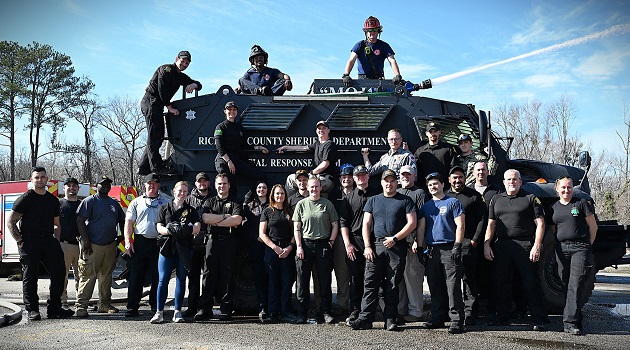Special medical training for Richland County deputies puts them in a class of their own
By W. Thomas Smith Jr.
Following months of intensive training in emergency medical care and now Advanced Life Support (ALS) licensing, the Richland County Sheriff’s Department (RCSD) has achieved a level of departmental emergency medical care considered the highest level of any law enforcement agency in South Carolina. Geared primarily toward RCSD’s Special Response (tactical) Team operators and potential operators, the ALS license is the capstone requirement for RCSD’s new TACTICAL MEDICAL PROGRAM which graduated its first class of deputy sheriffs in late January.
The ALS license, issued by the S.C. Department of Public Health, was awarded to RCSD on Wednesday, March 26.
“I’m proud to say our medical licensing inspection went well this morning, and we are officially licensed as an Advanced Life Support Provider Department,” said Maj. Dominick Pagano in a text to Richland County Sheriff Leon Lott and Deputy Chief Maria Yturria. “This encompassed us holding five different licenses to make it happen.”
Pagano added: “This ALS licensing allows our SRT medics and our internal Emergency Medical Technicians (EMTs) greater scope for providing care, and it creates more opportunities for the department.”
ALS is a level of emergency medical care that includes invasive procedures and advanced equipment. The ALS license is required for Paramedic level and above care.
The five licenses required for RCSD to achieve ALS certification included a license from the S.C. Board of Pharmacy, a Clinical Laboratory Improvement Amendments (CLIA) license through the federal Center for Medicare & Medicaid Services, an Infectious Waste license, as well as Paramedic and EMT licenses.
“Though other law enforcement agencies in South Carolina have emergency medical training and capabilities, none have it at the level we now bring to the table,” said Pagano. “Not on this scale.”
Through RCSD’s new TACTICAL MEDICAL PROGRAM, the department prepares deputies for the full spectrum of challenges experienced during any critical incident or emergency operation in central South Carolina. The 22-deputy graduating class (January 30, 2025) included deputies, hand-picked by Sheriff Leon Lott and his command staff, from all divisions and sub-departments within RCSD.
“The idea behind this program is to save as many lives as possible during large-scale events, critical incidents or disasters, either manmade and or natural,” said Pagano, a former U.S. Army paratrooper, who today serves as an RSCD Operations Division officer, and the director of RCSD’s Tactical Medical Program. “This program enhances the already existing skillset of the department by providing critical training and equipment needed for our deputies during events like active shooter response, other hostile events and natural disasters. What this training does is provide our deputies with the cognitive tools to provide lifesaving BLS [basic life support] care on scene.”
Pagano adds: “These deputies now have the capability of recognizing and stopping life-threatening exsanguination [essentially bleeding out] and providing rapid triage, and transport to an area hospital.”
Initially all of the select-deputies begin by successfully completing the 224-hour Basic Emergency Medical Technician (EMT) course at Midlands Technical College. That, or they must be previously certified as either an EMT or a paramedic in South Carolina.
The program-deputies then follow-up by taking their National Registry Test (required of all EMTs). Once certified, the deputies attend a 40-hour Tactical Medical Course that prepares them for the following: Tactical emergency casualty care, forcible entry, fire as a weapon (an emerging terrorist-tactic trend aimed at creating mass casualties or creating diversions ), hasty or expedient rescues (For instance, how to rapidly up-armor vehicles in order to conduct rapid rescues under fire), and emerging trends in terrorism.
“As the world continues to change we must adapt and be prepared to respond accordingly,” said Pagano. “This training coincides with our departmental Emergency Management Unit, which takes a holistic approach during critical events by providing many crucial services needed in times of crises.”
RCSD Deputy Chief Maria Yturria agrees.
“We need to be flexible, instinctively responsive, and fully capable during a critical incident involving limited or mass casualties,” said Yturria. “That is precisively what this training produces both within the individual deputy and in the broader tactical response culture here at RCSD.”
“What Maj. Pagano and Chief Yturria have created and facilitated through the implementation of this program might well-serve as a model for other law enforcement agencies statewide even nationally,” said Sheriff Leon Lott. “We are always looking for new, visionary, outside-of-the-box methods, programs, and ways of better preparing our men and women for the increasingly dangerous tactical environments peace officers are facing today and will face going forward.”
Lott adds: “We have always seen ourselves as standard-bearers in terms of tactical innovations, and this new tactical medical program is emblematic of this culture within our department.”
Partners with RCSD in the Tactical Medical Program include Midlands Technical College, Apprenticeship Carolina, the U.S. Department of Labor, Prisma Health, Richland County EMS, Columbia-Richland Fire Department, and Threat Suppression Incorporated.
Pagano says the next class of approximately 20 deputies for Tactical Medical Program training will begin in April. “It is a three-year commitment to be selected for the program that the deputy must adhere to,” he says.
In addition to training, qualification and full-licensing, “RCSD has a dedicated vehicle [van] that will carry our basic and advanced medical equipment,” says Pagano. “This medical van can be rapidly deployed during any kind of mass casualty event, natural and or manmade and or be pre-staged during events as a first-line level of care.”
– Pictured are Richland County deputies during a break in their tactical medical program training.


